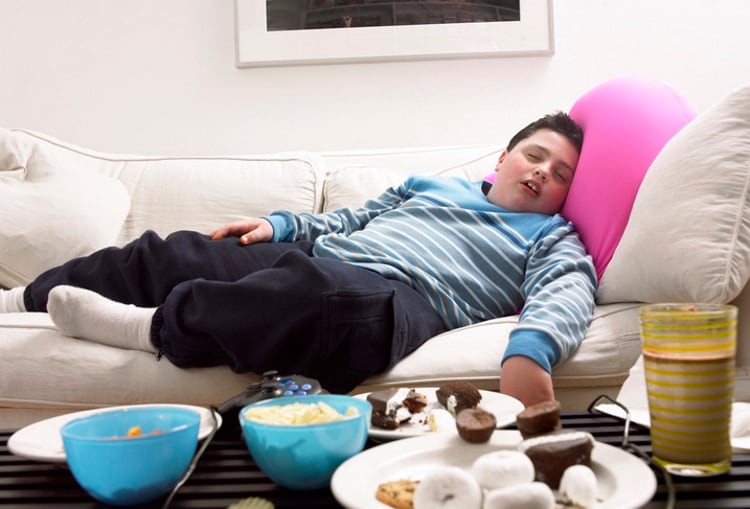The restrictions – which inhibit the promotion, packaging and placement of so-called ‘unhealthy food’ in stores and online – come into force in the UK in October 2022. Further proposals are set to be introduced from January 2023 relating to television and online advertising.
They are being implemented as a mean to help the nation improve its health.
Obesity is a major crisis in the UK, with 63% of adults classed as overweight or living with obesity. More shockingly, 1 in 3 primary school children fall within this category, too.
A recent study from the University of Glasgow found that obesity is now a bigger killer in England and Scotland than smoking, with obesity-related illnesses costing the country’s public funded healthcare system (NHS) over £6b a year.
Announcing the restrictions in July last year, Public Health Minister Jo Churchill said “The COVID-19 pandemic has brought into sharp focus the impact that an unhealthy weight can have on people’s health. We know families want the healthy choice to be the easy choice, and restricting promotions on unhealthy foods will help them achieve this.”
However, SPQR Communications has revealed the majority of British adults do not support the ‘tobacco-style’ restrictions as a means of fighting obesity.
Only 18% of Brits support all the restrictions, while 34% support some of the moves and 43% are totally opposed.
New enemy of our times
The survey of 2,000 people – conducted by YouGov on behalf of the London-based communications and strategy consultancy – is part of a white paper exploring the parallels between the war on smoking in the past decade and the new battle with obesity.
It argues the current approach to junk food follows the trajectory of tobacco control, with worrying implications for brand value.
“The playbook that was developed for tobacco control has been repurposed and applied to the new enemy of our times – obesity,” said Michael Coppen-Gardner, MD of SPQR Communication.
“From the soft drinks levy in 2018 to the recommendations of Henry Dimbleby’s National Food Strategy in 2021, interventionism is becoming the de facto approach for tackling obesity.
“But our research raises an important question for policymakers – namely, how effective will anti-obesity measures be if they are out of step with public opinion?”
What does the public think?
According to SPQR, it’s estimated that British shoppers currently spend 40% of their grocery budget on HFSS goods, 15% of which is spent on the types of products that will face the most restrictions.
There have been varying estimates as to the financial impact on brands, with estimates ranging from revenue losses of between £27m and £1.2bn. Research by brand valuation consultancy Brand Finance estimated the potential value loss to businesses worldwide would be around $430b if standardised packaging were extended to drinks.
In the survey commissioned by SPQR, people were asked for their views on a variety of potential future restrictions, including branding bans, the removal of brand generated characters, mandatory health warnings and full-on plain packaging.
- Only 18% of people back all the restrictions.
- 47% think plain packaging would have no impact on their purchasing decision, while 11% say it will. The most sceptical are the over 55s.
- 47% are opposed to HFSS products carrying mandatory health warnings versus 35% who give the concept a thumbs up. Interestingly, more than half of women aged 18-44 disagreed with health warnings.
- 29% of the public support the removal of all branding (including logos and mascots) from HFSS products.
- Despite the general opposition to the restrictions, there is still cause for concern over the problem of childhood obesity, and nearly twice as many adults support the removal of brand-generated characters from HFSS products to make them less appealing to children. There are still the 23% of don’t agree with this move.
Public not on board
In October, the HFSS restrictions will ban multibuy promotions such as ‘buy one get one free’ or ‘3 for 2’ offers on HFSS products.
‘Less healthy’ promotions will also be banned from key locations, such as checkouts, store entrances, aisle ends and their online equivalents.
According to UK’s Department of Health and Social Care, the rules follow consultation with industry. The run up has seen numerous brands reformulating their recipes or launching NPD to avoid the civil penalties that will be implemented for non-compliance.
The government’s obesity strategy has also seen the introduction of mandatory calorie labelling in restaurants, cafes and takeaways this month, while restrictions for the advertising of HFSS products being shown on TV before 9pm and online will come into force at the end of 2022.
Coppen-Gardner, however, warns the industry risks going backwards if the government continues down this path.
“The public aren’t on board with these measures – in fact, our YouGov survey suggests we’ve already reached the boundary of public tolerance with the proposed advertising and promotion restrictions,” he said.
“Instead, we need new ideas that align public health objectives with public opinion. On few topics is that more important than when it comes to the food we eat.”


